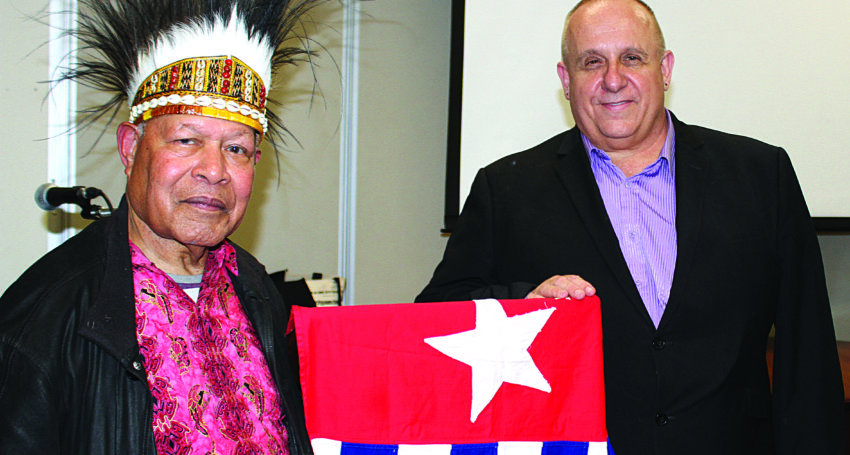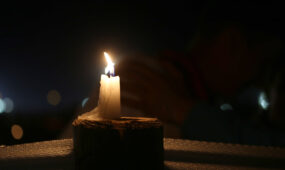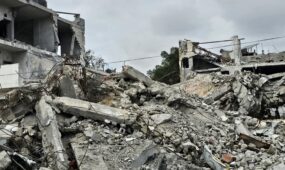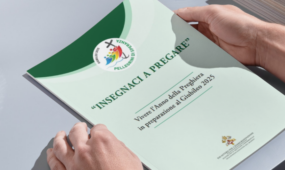West Papua at ‘tipping point’
International
Many “horrible things” are happening and constant intimidation, harassment, torture and killings of West Papuan people has brought the province to a “tipping point”, a public forum in Adelaide heard recently.

Peter Arndt, executive officer of the Catholic Justice and Peace Commission of Brisbane, told about 50 local supporters who attended the forum in the Cathedral Hall that more than 500,000 West Papuans have been “slaughtered” by security forces since West Papua was annexed and put under Indonesian control in the 1960s.
Described as a ‘silent genocide’, Mr Arndt urged the Australia Government to take action for intervention in the small territory located just 250km north of our mainland.
Advertisement
“We need to put more pressure on the Australian Government about what is happening in West Papua,” Mr Arndt said, adding that “unions, churches and academia” all had a part to play in this.
Besides ongoing human rights abuses, Mr Arndt said the influx of Indonesian migrants – mainly from Java – also was having a huge impact on indigenous West Papuans.
“They are turning Papua into something that is very, very different culturally, socially and economically from what Papuans believe is their traditional way.
“There is growing conflict between groups of Indonesian migrants and Papuans, from the youth to older people fighting with each other and the militias that are developing to pressure the local Papuans.
“Underlying all of this – the violence, economic marginalisation – is deep, deep racism,” he said.
In 2016 Mr Arndt and Sr Susan Connelly RSJ from Sydney travelled through Merauke, Jayapura, Timika and Sorong in West Papua on a human rights fact finding mission. They heard many stories of bashings, torture, murder, economic hardship, social marginalisation and cultural deprivation.
Their report, We Will Lose Everything, outlines many human rights violations taking place and indicated that West Papua is at a “tipping point”.
“In less than five years the position of Papuans in their own land will be worse than precarious. They are already experiencing a demographic tidal wave. Ruthless Indonesian political, economic, social and cultural domination threatens to engulf the proud people who have inhabited the land they call Tanah Papua for thousands of years,” the report said.
The changing religious mix in the country is also causing tension.
“The influx of Indonesian migrants has meant the rapid growth of Islam in a land where Christianity was overwhelmingly the majority religion.
“Many mosques have sprung up in recent years. Near one Catholic Church we visited three mosques have been built in the last few years. It is predictable that where the religious mix has altered significantly in a short period of time, tensions can easily develop,” the authors of the report stated.
Advertisement
Despite all the atrocities and unrest in the province, Papuans had an “unmistakeable determination” to strive for the “long cherished dream of freedom”.
With many references to East Timor’s struggle for freedom, the forum heard how West Papuans wanted to be given the opportunity for a “free and fair vote” on whether to stay in Indonesia or become independent.
Rex Rumakiek, an executive member of the United Liberation Movement for West Papua (ULMWP) said while West Papuans were “living in fear for their lives” they were “ready to sacrifice themselves if this is what they have to do”.
The former freedom fighter, together with exiled independence leader Benny Wenda, presented a petition signed by 1.8 million West Papuans to the United Nations. The petition asked for the UN to appoint a special representative to investigate human rights abuses in the province and to put West Papua back on the decolonisation committee agenda and ensure their right to self-determination.
Mr Rumakiek urged Australians to get behind their fight for freedom and assist with fundraising where ever possible. He said money raised is used to send delegations to international conferences, the UN and target countries for their support.
“Our presence is important in helping them to influence their decision making for the solution. We need your support,” he said.








Comments
Show comments Hide comments